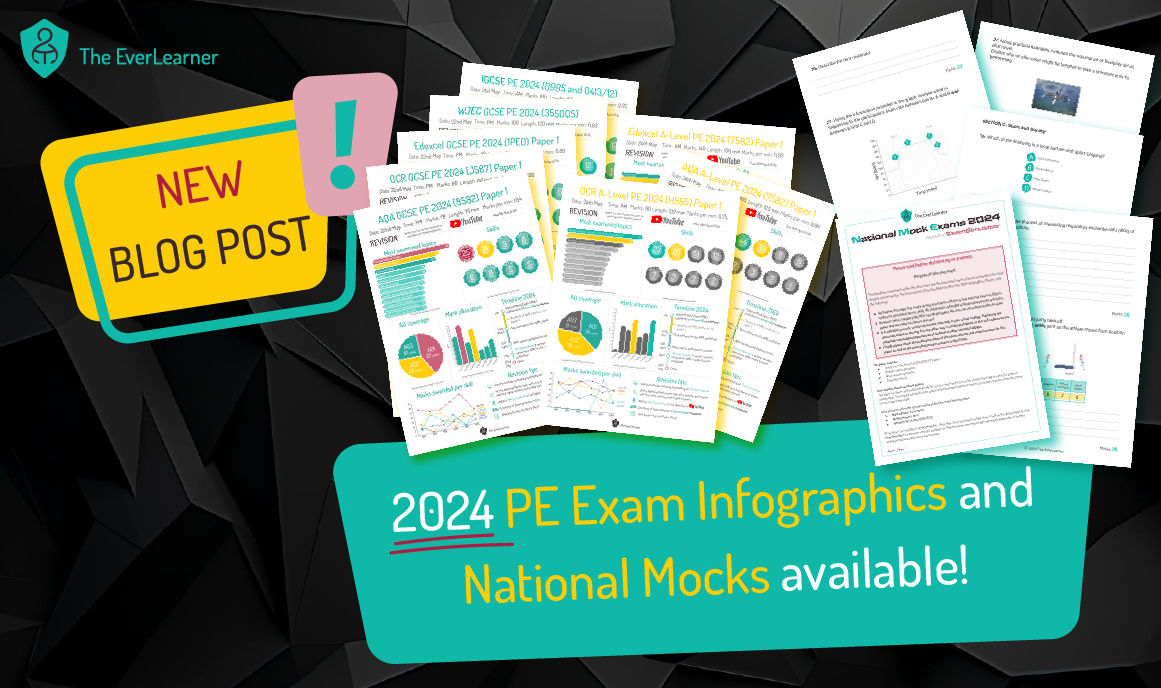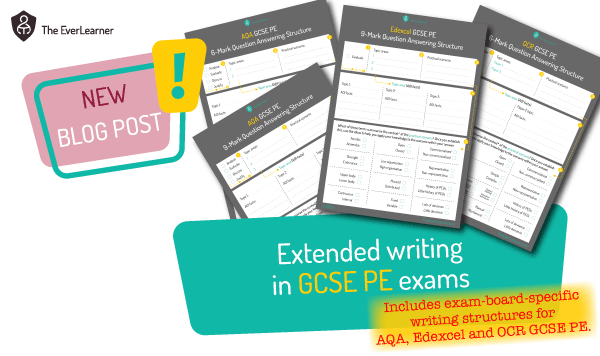You asked for it! Extended writing for ALL PE exams 😲
UPDATED: All Edexcel A-Level resources for extended writing questions are now available below
I am inundated with requests for me to train PE departments (and sometimes their students) about CPD training for extended-writing skills in GCSE and A-level PE exams. In the vast majority of cases, I have to turn that work down, as I don’t tend to have the capacity to do it in addition to my day job. Because of this, I have decided to continue to push into freemium resources that all PE teachers can use with their PE students in order to get them to write better in extended formats.
I should be clear about a few things. Firstly, I really care about how my students –all students, in fact–, write. What follows is not simply a mechanistic approach to what “you need to do for your exam”. No! What follows is guidance on good writing –good thinking, in fact– that just happens to be structured into the specific formats of GCSE and A-level PE extended writing. The principles contained could be applied to any writing environment, including shorter responses that students might need to make.
I write my extended writing resources with a few principles in mind:
- Principle 1: Students retain the freedom to write as they choose.
- Principle 2: Good writing comes from the introduction of good scaffolding early in a course.
- Principle 3: Scaffolding needs to be gradually removed from students as they progress through a course.
- Principle 4: Good exam-answering skills are reliant on good exam-question-writing skills.
Principle 1
Students retain the freedom to write as they choose.
Students should not be told how to structure their sentences. Think about this point: imagine that someone told you how your written sentences should be structured. How would you experience that? Would it be comfortable? Do you think that specific sentence structures would work in all circumstances? In my opinion, it is not educationally acceptable for any teacher to dictate sentence structure to any student. Rather, they should be shown what good writing looks like and then be provided with the resources to achieve that standard. Students must retain the right to “write like themselves” and, where possible, their writing flair should be embraced with good scaffolding and appropriate feedback.
Principle 2
Good writing comes from the introduction of good scaffolding early in a course.
What will follow below is not targeted as a last-minute revision cramming resource. Rather, teachers should introduce these resources early and allow students to develop sensitivity to them over time.
Principle 3
Scaffolding needs to be gradually removed from students as they progress through a course.
Put simply, students should be writing without these frameworks in the months and weeks leading up to their exams. Yes, some students may remain with the resources for longer but, even in these cases, students need to relinquish their scaffold prior to assessments.
Principle 4
Good exam-answering skills are reliant on good exam-question-writing skills.
It would be a wonderful world if Edexcel, AQA and OCR wrote their exam questions in a consistent format with command terms always expressing the same skills. Exam boards do achieve this –sometimes– and I want to remind readers that question interpretation remains a key skill for all students.
So, let’s get to it
I am writing this post this week because I have just completed my work on the brand-new Edexcel A-level PE extended writing frameworks for the 8- and 15-mark questions, including synoptic questions. These resources can be downloaded below. But I am also republishing my resources for AQA, Edexcel and OCR GCSE PE and for AQA and OCR A-level PE (in case you missed them).
| Exam board | Course | Framework |
| AQA | GCSE PE |
6-mark question |
| A-Level PE | Paper 1 8-mark question Paper 1 15-mark question Paper 2 8-mark question Paper 2 15-mark question |
|
| Edexcel | GCSE PE | 9-mark question |
| ✽ A-Level PE |
✽ Paper 1 8-mark question |
|
| OCR | GCSE PE |
6-mark question |
| A-Level PE |
Paper 1 20-mark question |
✽ New in this blog post
All told, what is detailed above is relevant in the support of approximately 85,000 students per year to write their extended responses better and I urge PE teachers to get these resources into students’ hands.
What about other courses?
I intend to publish frameworks for BTEC Tech, OCR National (R180 and R184) and BTEC Sport, BTEC Sport and Exercise Science and OCR Technical Level 3 later this academic year. All of these resources will be completely free.
I also want to remind customers of The EverLearner Ltd that you have exclusive access to CPD sessions on these resources, which can be accessed by our encrypted pages previously shared with you. If you are unsure about how to find these, please get in touch.
And finally…
Those of you who read my blog regularly will know that I never want to write negatively or criticise anyone or their work. Bluntly, life’s too short for that kind of stuff. However, I do want to take the opportunity to mention that I have reviewed every other published solution on the market before I published my own resources for extended writing in PE. Let me put it this way: if there had been someone out there doing it well, I wouldn’t be writing this post. Remember, I am putting my resources out there for nothing and I am doing so because of the absence of leadership as well as good publishing in this environment. Therefore, I urge PE teachers to support these resources by downloading them (freely) and utilising them with students.
Thank you for reading
James
%20Text%20(Violet).png)


